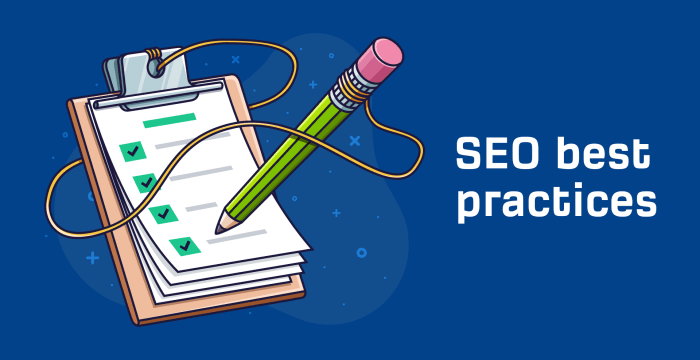SEO Best Practices – Best Practices takes the spotlight in this guide, offering a peek into the world of optimizing websites for maximum impact. Dive in for a fresh take on boosting your online presence!
Importance of Best Practices: SEO Best Practices

In today’s digital landscape, adhering to best practices is crucial for ensuring online visibility and driving organic traffic to websites. By following these practices, websites can improve their search engine ranking, attract more visitors, and ultimately increase their chances of conversion.
Enhanced User Experience
Implementing best practices such as optimizing website speed, improving mobile responsiveness, and creating high-quality content not only pleases search engines but also enhances the overall user experience. This leads to lower bounce rates, longer dwell times, and increased engagement, ultimately signaling to search engines that your website is valuable to users.
Higher Search Engine Ranking
When websites follow best practices like using relevant s, meta tags, and internal linking structures, search engines are better able to crawl and index their content. This, in turn, helps websites rank higher on search engine results pages (SERPs) for relevant queries, increasing visibility and driving more organic traffic.
Competitive Advantage
Websites that neglect best practices risk falling behind their competitors who are actively optimizing their online presence. By staying up-to-date with the latest techniques and strategies, websites can gain a competitive edge in the digital landscape, attracting more leads, customers, and opportunities for growth.
Impact of Neglecting Best Practices
Failing to implement best practices can have detrimental effects on a website’s performance. It may result in poor search engine rankings, decreased organic traffic, and missed opportunities for visibility and conversions. Ultimately, neglecting can hinder a website’s ability to reach its target audience and achieve its online goals.
On-Page Best Practices

In the world of , on-page optimization plays a crucial role in improving your website’s search engine rankings. By focusing on key elements such as meta tags, headings, content, and internal linking, you can enhance your website’s visibility and relevance to search engines.
Key Elements of On-Page
- Meta Tags: Optimizing meta tags, including title tags and meta descriptions, helps search engines understand the content of your web pages.
- Headings: Proper use of headings (H1, H2, H3, etc.) helps organize your content and makes it easier for search engines to index and understand the hierarchy of information on your page.
- Content: High-quality, relevant, and -rich content is essential for on-page . It not only engages your audience but also signals to search engines the relevance of your website for specific queries.
Significance of Optimizing Meta Tags, Headings, and Content for On-Page
Optimizing meta tags, headings, and content is crucial for on-page because it helps search engines understand the context and relevance of your web pages. By including relevant s in meta tags and headings, you can improve your website’s visibility for specific search queries. High-quality content not only attracts visitors but also signals to search engines that your website offers valuable information.
Internal Linking for On-Page
Internal linking involves linking to other pages within your website. It helps search engines discover and index other pages on your site, improving the overall visibility of your content. By strategically linking related pages, you can enhance the user experience and provide additional context for search engines to understand the relevance of your content.
Off-Page Best Practices
When it comes to off-page , it’s all about building your website’s reputation and authority on the web. This is done through various strategies that happen outside of your website itself.
The Role of Backlinks
Backlinks play a crucial role in off-page . These are links from other websites that point back to your site. The more quality backlinks you have, the more search engines view your site as reputable and trustworthy. Backlinks act as “votes” for your site’s credibility and can significantly impact your search engine rankings.
- Focus on obtaining backlinks from high-authority websites in your industry.
- Guest posting on relevant blogs can help you earn quality backlinks.
- Monitor your backlink profile regularly and disavow any toxic or spammy links.
The Importance of Social Signals
Social signals refer to the engagement and interactions your content receives on social media platforms. These signals can influence your off-page efforts by indicating to search engines that your content is valuable and worth sharing.
- Encourage social sharing of your content by including social sharing buttons on your website.
- Engage with your audience on social media to increase visibility and drive traffic to your site.
- Monitor social mentions and respond to comments and feedback to build relationships and credibility.
Strategies for Building a Strong Off-Page Profile, SEO Best Practices
Building a strong off-page profile requires a combination of tactics that focus on improving your website’s reputation and authority across the web.
- Create high-quality, shareable content that naturally attracts backlinks and social shares.
- Participate in online communities and forums related to your industry to establish yourself as an authority.
- Collaborate with influencers and industry experts to amplify your content and reach a wider audience.
Technical Best Practices
When it comes to technical , there are crucial aspects that can make a big impact on your website’s search engine optimization. From website speed to mobile-friendliness, these technical factors play a significant role in determining your site’s visibility and ranking on search engine results pages.
Website Speed and Mobile-Friendliness
Optimizing your website for speed is essential for both user experience and . A fast-loading site not only keeps visitors engaged but also improves your chances of ranking higher in search results. Similarly, ensuring that your website is mobile-friendly is key, as more and more users are accessing the web from mobile devices. Google even uses mobile-friendliness as a ranking factor, so it’s crucial to have a responsive design that adapts to different screen sizes.
Schema Markup and Its Impact on
Schema markup is a form of structured data that helps search engines understand the content on your website better. By implementing schema markup, you can provide search engines with additional context about your content, which can lead to rich snippets and enhanced search results. This can result in higher click-through rates and improved visibility in search results, making schema markup a powerful tool for boosting your efforts.
Optimizing Site Structure for Technical
Optimizing your site structure involves organizing your website’s content in a logical and hierarchical manner. This not only helps search engine crawlers navigate your site more efficiently but also makes it easier for users to find the information they’re looking for. By optimizing your site structure, you can improve indexation, crawlability, and overall user experience, all of which contribute to better technical performance.
